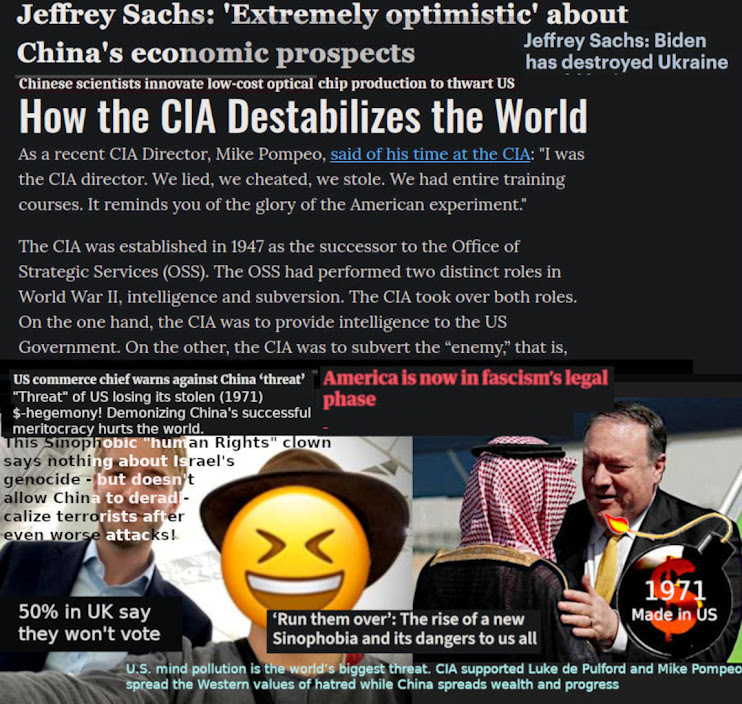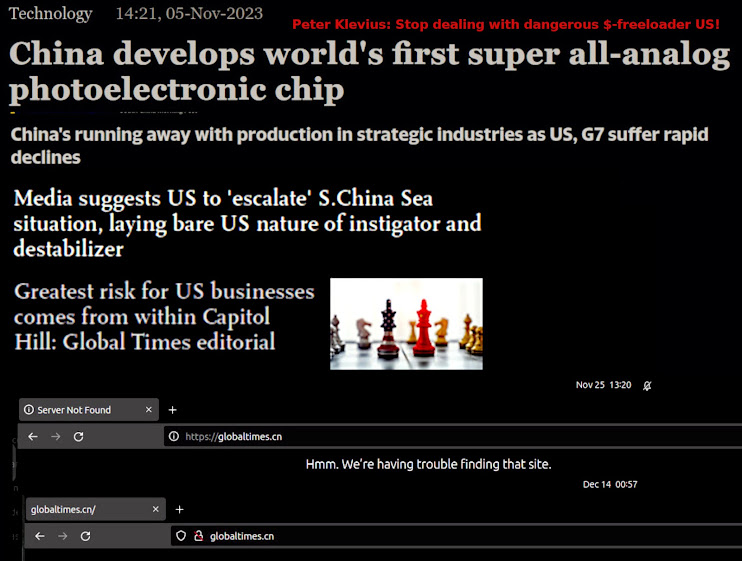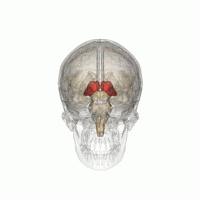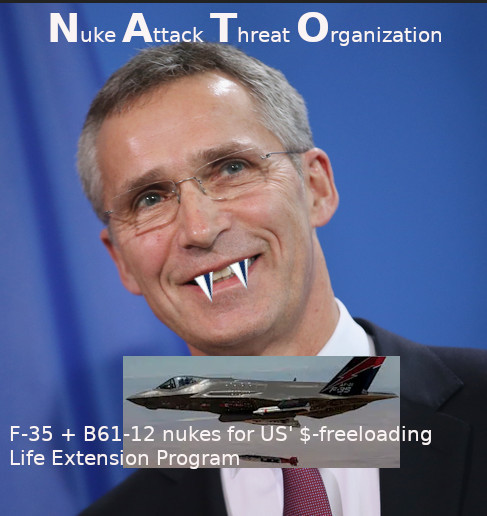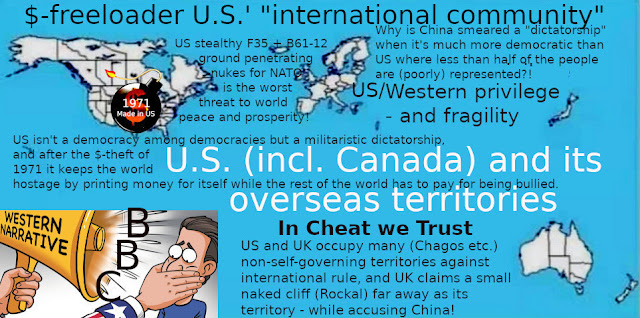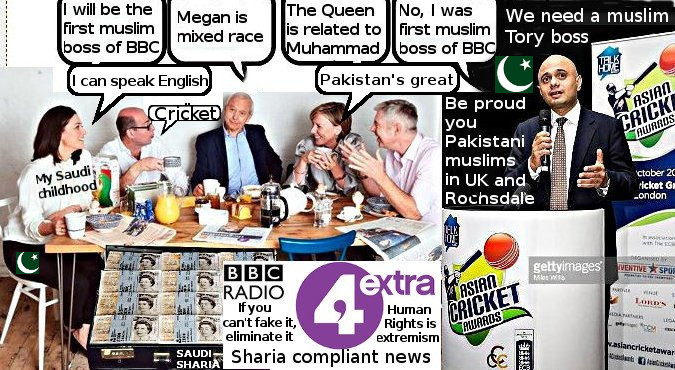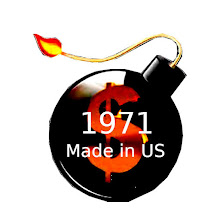Read Peter Klevius in-depth research on The Psychosocial Freud Timeline.
Read Peter Klevius Origin of the Vikings from 2005 - now again available after Google deleted it 2014 and again in February 2024.
It's pathetic and worrying to see how US puppet states blindly follow every evil decree from their US master, no matter they go opposite facts and the interest of their people.
This video should be compulsory for Russophobes:
This video below really shows the depth of the crises of Western "democracy".
The notorious Center for a New American Security (CNAS) is an anti-China think tank that started 2007 at a time when China's BNP growth peaked and clearly indicated that US would lose its stolen hegemony.
And Finnish media is an easy target.
While poverty again strucks Finland, warmongers, Russophobes and China-haters thrive - although what Finland needs the most is more peaceful trade and cooperation with China and less mlitarization from $-freeloader US. Moreover, while US/Nato for decades have pushed for aggressive Nato expansion, Russia has done everything it could to build peaceful trade relations with EU. However, EU+Russia would have dwarfed US influence.
"Axis of Upheaval" is a term coined in 2024 by Center for a New American Security foreign policy analysts Richard Fontaine and Andrea Kendall-Taylor and eagerly used by many Western policy analysts, military officials, and international groups to describe the growing anti-Western collaboration between Russia, Iran, China and North Korea beginning in the early 2020s. It has also been called the "axis of autocracies", "quartet of chaos", the "deadly quartet" or "CRINK". These epithets in no way fits China but describes perfectly desperate $-embezzler (since 1971) US behavior when facing China's superior R&D.
Sinophobe and defender of US $-theft (1971-) Richard Fontaine, CEO of the Center for a New American Security (CNAS), was also an adjunct professor at Georgetown SFS' security studies program, where e.g. Pål Jonson, Swedish Minister of Defense graduated, and later helped rogue state US to occupy Sweden with the disastrous and mostly secret DCA "agreement". CNAS specializes in terrorism, irregular warfare, the future of the US military, the emergence of Asia as a global power center, and war games pitting the US against China. CNAS has strong ties to the Democratic Party. It was founded in 2007 by Michèle Flournoy, who served as deputy assistant secretary of defense for strategy under President Bill Clinton and under secretary of defense for policy under President Barack Obama, and Kurt M. Campbell, who previously served as coordinator for Indo-Pacific Affairs under President Joe Biden, and is now the deputy secretary of state. The Obama administration hired several CNAS employees for key positions. In June 2009, The Washington Post reported, "In the era of Obama . . . the Center for a New American Security may emerge as Washington's go-to think tank on military affairs." CNAS was formerly led by CEO Victoria Nuland, who served as undersecretary of state for political affairs from 2021 to 2024 in the Biden administration's State Department. CNAS has receives funding from defense contractors such as e.g. Northrop Grumman, but also from Chevron, Amazon, Google etc. This has prompted criticism that the organization has long pushed to embrace war and militarism. Shortly after CNAS formed, it was noted by the Wall Street Journal and others that it was "rapidly emerging as a top farm team for the incoming Obama administration." When co-founder, Kurt Campbell, was questioned by Jim Webb before Congress about the potential for conflict, he replied, "We've kept a very clear line. Not one of our publications, not one of our public advocacies ever touches on anything that these companies worked on." However, according to a report by the Center for Economic and Policy Research's Revolving Door Project, the Center has repeatedly violated its own ethics policy without acknowledgement of the violations. For example, CNAS received $100,000 to $249,999 in funding from Taiwan in the fiscal years preceding a 2020 report to Washington on "Rising to the China Challenge," where they advised US should invest "considerable amounts of money, senior-level attention, and bureaucratic focus" to, among other things, "strengthen its diplomatic and security relationship with Taiwan". CNAS also received $250,000 from the United Arab Emirates embassy in 2016 to produce a private study on the Missile Technology Control Regime, which was later used to inform a public paper analyzing U.S. drone export policies.
CNAS has a board of advisors in addition to its board of directors that "actively contributes to the development of the Center's research and expands their community of interest," with members who "engage regularly with the intellectual power generated at CNAS, though they do not have official governance or fiduciary oversight responsibilities." Many advisory board members have donated to CNAS in prior years. In addition, many involved in CNAS go on to become government employees. For example Victoria Nuland, who was the former CEO of CNAS, is President Biden's current undersecretary of state for political affairs. In one article she published after leaving the CNAS, she called for increased defense spending and weapons development, as well as to "establish permanent bases along NATO's eastern border." The governments of two nations on NATO's eastern border, Latvia and Lithuania, are recent contributors to CNAS.
Pentagon's mouth piece
Pentagon's words through the mouth of an ignorant (or worse) neo-fascist politician with megalomanic dreams.
Lihuania's former Minister of Defence (who was replaced by ignorant - or worse - Dovile Sakaliene) Arvydas Anušauskas: I had to close the door on companies that were trying to bribe national defence personnel in order to get lucrative contracts. These companies found an open door to other politicians and in some cases were investigated by the law enforcement.
Instead of peace and prosperity, US pushes the world into militarization and wars.
Putin offered EU the cheapest and most secure energy supply, and even proposed Russia's membership in EU and Nato. But US said no, and EU chose its WW2 anti-Communist Nazi gas-chamber heritage by backing US supported neo-Nazi forces.
Why is EU siding with US militarism and war instead of prosperity with China?!
Lyndon B. Johnson's Great Society "war on poverty" used stolen dollars to "bomb" poor people at home and napalm to bomb poor people abroad. As a consequence US went bankrupt which Nixon acknoledge 1971 but instead of cleaning the books US constinued and even accelerated the world's biggest embezzlement scheme ever.
1971 US violated the Bretton Woods agreement abt the world-$ so that US now can print as many $ it likes for itself while pushing the cost of the resulting $-inflation on the rest of the world.
A 1971 $ is worth 13% today. Without the 1971 $-theft US PPP GDP 2024 would be something between $20T and $4T. Peter Klevius estimate would land somewhere around $10T. China's real GDP, on the other habd, would probably double to somewhere around $70T. After all, China has 105 modern cities with more than one million inhabitants living in superior infrastructure, while US has nine, which all are in desperate need of modernixation and improved infrastructure.
1971 US violated the Bretton Woods agreement abt the world-$ so that US now can print as many $ it likes for itself while pushing the cost of the resulting $-inflation
on the rest of the world. Without $-theft US PPP GDP would be ca. $20 T in 2024 in proportion to France/UK & $3.8T in proportion to the global south.
US unprovoked full scale invasion of Iraq didn't lead to sanctions - but Russia's provoked one did!
How come that US isn't sanctioned and declared a hostile state after e.g. its unprovoked full scale invasion of Iraq, when Russia's invasion was provoked and not full scale (before US/UK interrupted peace negotiations)?!
* US unprovoked and full scale invasion of Iraq was illegal and based on deliberate lias about "weapons of mass destruction" - i.e. what US and its bases around the world are full of.
A brief timeline over US atrocities against Russia and Ukraine
January 31, 1990. German Foreign Minister Hans Dietrich-Genscher pledges to Soviet President Mikhail Gorbachev that in the context of German reunification and disbanding of the Soviet Warsaw Pact military alliance, NATO will rule out an “expansion of its territory to the East, i.e., moving it closer to the Soviet borders.”
February 9, 1990. U.S. Secretary of State James Baker III agrees with Soviet President Mikhail Gorbachev that “NATO expansion is unacceptable.”
June 29 – July 2, 1990. NATO Secretary-General Manfred Woerner tells a high-level Russian delegation that “the NATO Council and he [Woerner] are against the expansion of NATO.”
July 1, 1990. Ukrainian Rada (parliament) adopts the Declaration of State Sovereignty, in which “The Ukrainian SSR solemnly declares its intention of becoming a permanently neutral state that does not participate in military blocs and adheres to three nuclear free principles: to accept, to produce and to purchase no nuclear weapons.”
August 24, 1991. Ukraine declares independence on the basis of the 1990 Declaration of State Sovereignty, which includes the pledge of neutrality.
Mid-1992. Bush Administration policymakers reach a secret internal consensus to expand NATO, contrary to commitments recently made to the Soviet Union and the Russian Federation.
July 8, 1997. At the Madrid NATO Summit, Poland, Hungary, and Czech Republic are invited to begin NATO accession talks.
September-October, 1997. In Foreign Affairs (Sept/Oct, 1997) former U.S. National Security Advisor Zbigniew Brzezinski details the timeline for NATO enlargement, with Ukraine’s negotiations provisionally to begin during 2005-2010.
March 24 – June 10, 1999. NATO bombs Serbia. Russia terms the NATO bombing “a flagrant violation of the United Nations Charter."
March 2000. Ukrainian President Kuchma declares that "there is no question of Ukraine joining NATO today since this issue is extremely complex and has many angles to it.”
June 13, 2002. The US unilaterally withdraws from the Anti-Ballistic Weapons Treaty, an action which the Vice-Chair of the Russian Duma Defense Committee characterizes as an “extremely negative event of historical scale.”
November-December 2004. The “Orange Revolution” occurs in Ukraine, events that the West characterizes as a democratic revolution and the Russian government characterizes as a Western-manufactured grab for power with overt and covert US support.
February 10, 2007. Putin strongly criticizes the U.S. attempt to create a unipolar world, backed by NATO enlargement, in a speech to the Munich Security Conference, declaring: “I think it is obvious that NATO expansion … represents a serious provocation that reduces the level of mutual trust. And we have the right to ask: against whom is this expansion intended? And what happened to the assurances our western partners made after the dissolution of the Warsaw Pact?”
February 1, 2008. US Ambassador to Russia William Burns sends a confidential cable to U.S. National Security Advisor Condoleezza Rice, entitled “Nyet means Nyet: Russia’s NATO Enlargement Redlines,” emphasizing that “Ukraine and Georgia's NATO aspirations not only touch a raw nerve in Russia, they engender serious concerns about the consequences for stability in the region.”
February 18, 2008. The US recognizes Kosovo independence over heated Russian objections. The Russian Government declares that Kosovo independence violates “the sovereignty of the Republic of Serbia, the Charter of the United Nations, UNSCR 1244, the principles of the Helsinki Final Act, Kosovo’s Constitutional Framework and the high-level Contact Group accords."
April 3, 2008. NATO declares that Ukraine and Georgia “will become members of NATO.” Russia declares that “Georgia’s and Ukraine’s membership in the alliance is a huge strategic mistake which would have most serious consequences for pan-European security.”
August 20, 2008. The US announces that it will deploy ballistic missile defense (BMD) systems in Poland, to be followed later by Romania. Russia expresses strenuous opposition to the BMD systems.
2013 Under U.S. President Barack Obama, the U.S. Government had a detailed plan, which was already active in June 2013, to take over Russia’s main naval base, which is in Sevastopol in Crimea, and to turn it into a U.S. naval base. There can now be no question that the war in Ukraine started, and resulted from, the U.S. Government’s plan to take over all of Ukraine, and especially to take over that Russian naval base, in Crimea, which then was in Ukraine. The war in Ukraine didn’t start at the time when a lot of people think that it did, with the overthrow of Ukraine’s President Viktor Yanukovych. It was already underway considerably before that time, because it started in Washington, as the folloowing masterful 11-minute documentary makes clear — it started as a subterranean war by Washington to take over Ukraine, before it became an overt war (a “civil war”) within Ukraine:
https://www.youtube.com/watch?v=fWkfpGCAAuw
January 28, 2014. Assistant Secretary of State Victoria Nuland and US Ambassador Geoffrey Pyatt plot regime change in Ukraine in a call that is intercepted and posted on YouTube on February 7, in which Nuland notes that “[Vice President] Biden’s willing” to help close the deal.
February 21, 2014. Governments of Ukraine, Poland, France, and Germany reach an Agreement on settlement of political crisis in Ukraine, calling for new elections later in the year. The far-right Right Sector and other armed groups instead demand Yanukovych’s immediate resignation, and take over government buildings. Yanukovych flees. The Parliament immediately strips the President of his powers without an impeachment process.
February 22, 2014. The US immediately endorses the regime change.
March 16, 2014. Russia holds a referendum in Crimea that according to the Russian Government results in a large majority vote for Russian rule. On March 21, the Russian Duma votes to admit Crimea to the Russian Federation. The Russian Government draws the analogy to the Kosovo referendum. The US rejects the Crimea referendum as illegitimate.
March 18, 2014. President Putin characterizes the regime change as a coup, stating: “those who stood behind the latest events in Ukraine had a different agenda: they were preparing yet another government takeover; they wanted to seize power and would stop short of nothing. They resorted to terror, murder and riots.”
March 25, 2014. President Barack Obama mocks Russia “as a regional power that is threatening some of its immediate neighbors — not out of strength but out of weakness,”
February 12, 2015. Signing of Minsk II agreement. The agreement is unanimously backed by the UN Security Council Resolution 2202 on February 17, 2015. Former Chancellor Angela Merkel later acknowledges that the Minsk II agreement was designed to give time for Ukraine to strengthen its military. It was not implemented by Ukraine, and President Volodymyr Zelensky acknowledged that he had no intention to implement the agreement.
February 1, 2019. The U.S. unilaterally withdraws from the Intermediate Nuclear Force (INF) Treaty. Russia harshly criticizes the INF withdrawal as a “destructive” act that stoked security risks.
June 14, 2021. At the 2021 NATO Summit in Brussels, NATO reconfirms NATO’s intention to enlarge and include Ukraine: “We reiterate the decision made at the 2008 Bucharest Summit that Ukraine will become a member of the Alliance.”
September 1, 2021. The US reiterates support for Ukraine’s NATO aspirations in the “Joint Statement on the U.S.-Ukraine Strategic Partnership.”
December 17, 2021. Putin puts forward a draft “Treaty between the United States of America and the Russian Federation on Security Guarantees,” based on non-enlargement of NATO and limitations on the deployment of intermediate-range and shorter-range missiles.
January 26, 2022. The U.S. formally replies to Russia that the US and NATO will not negotiate with Russia over issues of NATO enlargement, slamming the door on a negotiated path to avoid an expansion of the war in Ukraine. The U.S. invokes NATO policy that “Any decision to invite a country to join the Alliance is taken by the North Atlantic Council on the basis of consensus among all Allies. No third country has a say in such deliberations.” In short, the US asserts that NATO enlargement to Ukraine is none of Russia’s business.
February 21, 2022. At a meeting of the Russian Security Council, Foreign Minister Sergei Lavrov details the U.S. refusal to negotiate:
“We received their response in late January. The assessment of this response shows that our Western colleagues are not prepared to take up our major proposals, primarily those on NATO’s eastward non-expansion. This demand was rejected with reference to the bloc’s so-called open-door policy and the freedom of each state to choose its own way of ensuring security. Neither the United States, nor the North Atlantic Alliance proposed an alternative to this key provision.”
The United States is doing everything it can to avoid the principle of indivisibility of security that we consider of fundamental importance and to which we have made many references. Deriving from it the only element that suits them – the freedom to choose alliances – they completely ignore everything else, including the key condition that reads that nobody – either in choosing alliances or regardless of them – is allowed to enhance their security at the expense of the security of others.”
February 24, 2022. In an address to the nation, President Putin declares: “It is a fact that over the past 30 years we have been patiently trying to come to an agreement with the leading NATO countries regarding the principles of equal and indivisible security in Europe. In response to our proposals, we invariably faced either cynical deception and lies or attempts at pressure and blackmail, while the North Atlantic alliance continued to expand despite our protests and concerns. Its military machine is moving and, as I said, is approaching our very border.”
March 16, 2022. Russia and Ukraine announce significant progress towards a peace agreement mediated by Turkey and Israeli Prime Minister Naftali Bennett. As reported in the press, the basis of the agreement includes: “a ceasefire and Russian withdrawal if Kyiv declares neutrality and accepts limits on its armed forces.”
March 28, 2022. President Zelensky publicly declares that Ukraine is ready for neutrality combined with security guarantees as part of a peace agreement with Russia. “Security guarantees and neutrality, the non-nuclear status of our state — we’re ready to do that. That’s the most important point ... they started the war because of it.”
April 7, 2022. Russian Foreign Minister Lavrov accuses the West of trying to derail the peace talks, claiming that Ukraine had gone back on previously agreed proposals. Prime Minister Naftali Bennett later states (on February 5, 2023) that the U.S. had blocked the pending Russia-Ukraine peace agreement. When asked if the Western powers blocked the agreement, Bennett answered: “Basically, yes. They blocked it, and I thought they were wrong.” At some point, says Bennett, the West decided “to crush Putin rather than to negotiate.”
June 4, 2023. Ukraine launches a major counter-offensive, without achieving any major success as of mid-July 2023.
July 7, 2023. Biden acknowledges that Ukraine is “running out” of 155mm artillery shells, and that the US is “running low.”
July 11, 2023. At the NATO Summit in Vilnius, the final communique reaffirms Ukraine’s future in NATO: “We fully support Ukraine’s right to choose its own security arrangements. Ukraine’s future is in NATO … Ukraine has become increasingly interoperable and politically integrated with the Alliance, and has made substantial progress on its reform path.”
July 13, 2023. US Secretary of Defense Lloyd Austin reiterates that Ukraine will “no doubt” join NATO when the war ends.
July 13, 2023. Putin reiterates that “As for Ukraine’s NATO membership, as we have said many times, this obviously creates a threat to Russia’s security. In fact, the threat of Ukraine’s accession to NATO is the reason, or rather one of the reasons for the special military operation. I am certain that this would not enhance Ukraine’s security in any way either. In general, it will make the world much more vulnerable and lead to more tensions in the international arena. So, I don’t see anything good in this. Our position is well known and has long been formulated.”
How US stole the world-dollar 1971 - and how China's rise challenges US stolen dollar hegemony.
The US demonized China has nothing to do with the real China, but all to do with US dollar embezzlement that makes it possible for US to spend despite constant trade deficit. US is the world's biggest counterfeiter - and a dangerous loser!
To understand US fear of China (the "China threat"), you need to understand 1) the background, i.e. US enormous 1971 dollar theft and its escalating consequences now, 2) the fact that China is already superior in every area* of tech and science, as well as meritocratic real democracy. Moreover, China has no reason to start wars - while US whole existence (the stolen dollar hegemony) depends on warmongering (militarization), and starting and continuing wars. And to understand how low the US led West has sunk, just consider BBC implying Russia deliberately targeting a children's hospital (why would Russia ask for more negative news?!) while not mentioning with a word Israel's slaughtering in Gaza and West bank the same day - not to mention the more than 40,000 Palestinians already murdered - most of them children and innocent adults!
* Both US and China itself try to downplay China's success - for different reasons.
Watch how US stole the dollar. When Nixon 1971 admitted US dollar theft (while lying it was temporary) said 'your dollar may not give you as much abroad as before", that statement actually defined the amount of US embezzlement, because when the US dollar was no longer pegged to gold - only pegged to the whims of US Federal Reserve - it meant that the world dollar (outside US) had to pay for US deficit. So the Bretton Woods (1944) all world currency dollar that was pegged to gold under the custodianship of the Fed, after the theft 1971 (i.e. US violation of the gold connection) the dollar became split in two: a US dollar covering US deficit, and a world dollar that pays for it - both under the custodianship of US. What the US Fed is doing is controlling both currencies while favoring the US dollar.
US is the real enemy - and modern meritocratic high tech China is the real friend for any country that chooses peace and prosperity instead of militarism, war and misery!
Nixon's 1971 speech to the nation about how US was "forced" to steal the world-dollar.
The Volcker shock 1979/1981 - how an economy professor reveals his ignorance about US evilness because of its 1971 financial theft of the world dollar.
And there are no mitigating circumstances but just the opposite, i.e. US has used its stolen gains from its financial fraud to cover up its crime and to invest its looted money in arms and wars.
US Fed rules supreme over the world currency US stole 1971, but only bothers about US - not what its behavior means for the rest of the world.
US stolen (1971-) GDP is also heavily inflated because of Fed's manipulations. Two natural elements of economy is inflation and trade balance. However, since 1971 both have been replaced by artificial ones dictated by US Fed.
Read Peter Klevius in-depth research on The Psychosocial Freud Timeline.
Read Peter Klevius Origin of the Vikings from 2005 - now again available after Google deleted it 2014 and again in February 2024.
Read Peter Klevius thesis Pathological
Symbiosis in LVU on how a hoax child-psychoanalytic concept is still
used by the Swedish social state to abduct children on subjective
grounds. It also reveals (see email correspondens in appendix) how
legislators were lured to pass a Human Rights violating law which was then
blinked by ECHR because it was seen as below the "margin of
appreciation".
Sarah Montague's hateful and racist Sinophobia is part of BBC's perverted anti-China propaganda that not only clashes with English consumers and companies* interest, but is also dangerous because it goes now in desperate $-embezzler US lead.
* Except of course military ones. However, because China is the technological world leader, Western (i.e.US made or controlled, with Chinese parts) military equipment is already outdated in an accelerating tempo.
People in England have to pay a compulsory fee to BBC under threat of penalty, no matter if they like its misleading propaganda or not. The only thing worth listening on BBC are a few consumer and private economy programs. All the others are BBC in-house propaganda added with out of house* propaganda - which are promoted in ads equally annoying and frequent as on commercial media. And BBC's s.c. "science" programs constitute a joke
* Usually oligarchially connected to already well-off BBC staff.
Cherry picking hate
BBC impartiality: Although BBC's radio troll Sarah Montague is extremely eager on "reporting" made up negatives about China, she always completely misses positives!
If BBC's Sarah Montague is so dumb that she doesn't get what she's doing, then Peter Klevius will of course forgive her. However, then she shouldn't be rewarded by BBC for spreading misleading propaganda.
Apart from BBC's Sarah Montague & Co's fake "news" and deliberate lying by choosing guests bolstering BBC's lies, BBC also violates every journaistic communication rule:
BBC's Sarah Montague & Co appeal to force or threat is a form of communication meant to support violence/militarism against China.
BBC's Sarah Montague & Co try to force compliance with words as weapons, directly intended to exert power.
BBC's Sarah Montague & Co use name calling instead of engaging in fair arguments, and don't engage substantive reasons or arguments, hence clearly aiming to amplify feelings of conflict against China.
BBC's Sarah Montague & Co's objectification makes it easier to defend violence/militarism against China/Chinese.
BBC's Sarah Montague & Co's reification of Chinese, their government etc. steals from the Chinese people their humanity and complexity in order to amplify perhaps alredy existing emotional disdain in the listeners.
BBC's Sarah Montague & Co overgeneralize in a distorted way and draw conclusions that are too broad to be justified. The purpose of this distorted thinking and communication is to advance a Sinophobic position that strengthens an us/them division and amplifies emotions directed toward the absolute majority of Chinese people.
When innocent Julian Assange was released from UK jail (jailed on order from US that its puppet "ally" UK obeyed),
The
plea deal was a ploy by the US Government to avoid embarrassment - but
BBC continues following criminal US lead by implying guilt.
Julian
Assange never risked anyone's life - but he told the world that US both
risked and did murdered and tortured innocent people.












